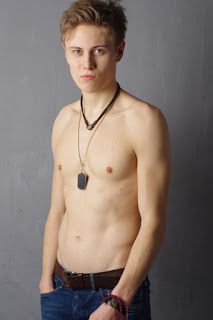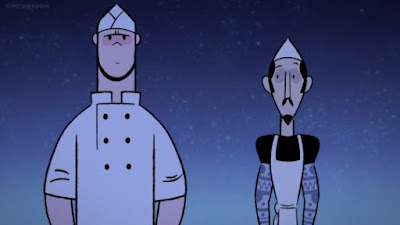The Bravest Knight (2019) is advertised as the first children's animation to have an "openly gay main character." Actually, that would be
Paranorman (2012). I wanted to see how "open" the gay main character was, so I watched the first two episodes.
Episode 1, Scene 1: In a fairy tale world, Sir Cedric (T.R. Knight, left) is giving his daughter, Nia, lessons in how to become a knight. Today's lesson: how to save someone trapped in a tower. His husband, Prince Andrew (Wilson Cruz, below), has volunteered to be rescued. First, build a ladder -- or the prisoner could just lower a rope. Prince Andrew has to be somewhere, so could we speed things up? No,Siir Cedric has to tell a story. The consort of a royal is always a rank down, so Prince Andrew and Sir Cedric.
Scene 2: Flashback. The preteen Cedric (Chance Hurstfield) is in his second year as a knight in training. He sees a flyer: all of the villains have broken out of Fairy Jail! So he sets out to,,,um...arrest them? But first he encounters a troll named Grunt (Bobby Moynihan), who tells his story.
Scene 3: Grunt used to have a bridge, like most trolls. But Sturk, one of the villains who broke out of Fairy Jail, took it away from him. Wait -- the notice just went up, but Grunt says that he's been bridge-less for weeks. This timeline is convoluted.
Scene 4: Cedric abandons his original quest to help Grunt get his bridge back. Problem: Grunt doesn't remember where it is. While searching, they hear a woman screaming from a tower, and set off to rescue her. She obligingly lowers her long hair for them to climb.
But it's a trap! A witch who recently escaped from Fairy Jail grabs them and throws them into a pit, where they meet several other would-be rescuers. What is her end game? Is she going to eat them, or what?
Scene 5: Their escape plan: they cover themselves in mud, so the witch will think they have escaped. When she comes down to investigate, they incapacitate her with mud and climb out on the hair-rope. Then they call the adults for assistance, and the witch is returned to Fairy Jail.
Scene 6: Moral: Don't grab a rope unless you are sure what's on the other end. Presumably this generalizes to: don't begin a course of action unless you are fairly certain how it will turn out.
Episode 2, Scene 1: Today's lesson is about jousting. Nia is upset that her opponent will be the troll Grunt, who can't even control his horse. "Never underestimate your opponent," Sir Cedric cautions. And so the story..
Scene 2: Preteen Cedric and Grunt, searching for the lost bridge, eome across a children's jousting tournament. Another troll, Susie, is scrounging for coins under the bleachers.
Scene 3: Cedric signs up to compete, but he doesn't have any armor, so he and his troll friends fashion a helmet from a pumpkin. His opponent is a very small boy in a green helmet. "Look how tiny he is!" Grunt exclaims. "You'll win easily." But his opponent trounces him.
Surprise -- it's a girl! At this point one would expect Cedric to dissolve into a pool of hormones, except that we already know that he's gay. They just shake hands.
Why is "It's a girl!" a big reveal? We've already established that girls commonly train as knights, so why wouldn't they joust?
Scene 4: Eliminated from the competition, Cedric and the trolls watch from the stands as the girl -- Eyame -- bests three more opponents and wins the tournament. She is modest -- "I was fortunate today," but Cedric is effusive in his praise: "I learned more from watching you than in all my years of practicing back on the pumpkin farm!"
Scene 5: Susie the Troll suggests that they go to the abandoned, scary Dark Castle, which has maps of the kingdom. Maybe it will show the bridge.
Scene 6: Back in the present, Sir Cedric repeats the moral: Never underestimate your opponent.
Story Arc: The flashbacks for the first season are about Cedric and grunt looking for the lost bridge, and meeting people who will apparently be important in their lives later. But we don't get any later. I want to know about life in the kingdom today. Or how Cedric and Prince Andrew met. I don't want to know about some dumb bridge.
Didacticism: This show is obviously for young children, not adults, but still, is it really necessary to hit us over the head with a moral, twice per episode? It seems old-fashioned and contrived.
How Open is Cedric: His husband appears only briefly in the first scene of the first episode, and then is never mentioned again. The child Cedric doesn't display any romantic interest in anyone, boy, girl, or troll. I'd say "not very open": you could easily miss it.
To be fair, Prince Andrew appears in the first scene of several later episodes, often trying to get Cedric to settle down to official business, which is interrupted by a story.
My Grade: A> I was bored stiff, but young children might not be, and having a gay character in a starring role in a program aimed at the kindergarten-set is amazing, even if his husband doesn't appear often.

.png)



















